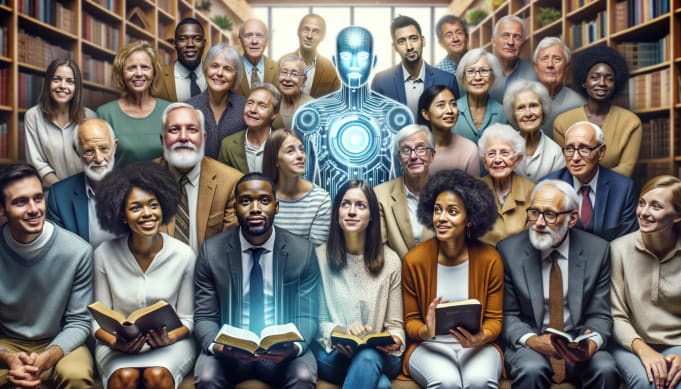
The Christian Response to AI Advancements
AI should never replace pastors, community, or the essence of human interaction. This stance isn't just a personal opinion; it’s supported by studies showing a rise in loneliness and mental health issues corresponding with increased technology dependence. Recent data indicates that technology use, including AI, has become a double-edged sword in our lives (Source: APA, 2021). Today, we'll dive into how Christians can respond to AI advancements while staying true to biblical principles.
Understanding Christian Audiences' Intent and Challenges
Navigating the rapid pace of AI advancements can feel overwhelming. As Christians, we're often left wondering how to reconcile our faith with these powerful new tools. Our questions typically revolve around the ethical implications, potential benefits, and, quite frankly, the risks associated with AI. So, in this post, I aim to provide you with an exhaustive, yet digestible, resource on how we can thoughtfully engage with AI while upholding Christian values.
The Role of Experience and Firsthand Knowledge
As someone who has integrated Christian faith into AI development—notably through FaithGPT—you can trust that I’m sharing insights grounded in both experience and biblical considerations. Whether you’re a fellow developer, church leader, or simply curious, I’m here to help you navigate these waters with wisdom.
Building Rapport with Challenges and Interests
AI and the Image of God (Study Guide)
Packed with Bible verses and thought-provoking questions, this study guide explores AI's effect on areas like creativity, morality, work, privacy, and the church itself.
Download NowTo address the challenges you might face, let's consider some common concerns:
- Can AI align with Christian ethics?
- Will AI replace human roles in the Church?
- How can we leverage AI to deepen our faith without compromising human connection?
Let's Dive In Together
Let’s tackle these questions head-on, weaving through biblical truths, real-world examples, and data-driven insights to build a balanced Christian perspective on AI advancements.
AI: A Tool, Not a Substitute
First things first, AI is a tool—one that holds enormous potential for good. Yet, it is vital to emphasize that it is not a replacement for human interaction, community, or pastoral guidance.
The Biblical Basis
In Genesis 2:18, God said, “It is not good for the man to be alone. I will make a helper suitable for him.” This underscores the importance of human interaction. While AI can enhance our understanding of the Bible, it will never replace the human touch God deemed necessary.
Real-world Applications
Using AI effectively:
- Analyze biblical texts for deeper understanding.
- Assist in creating Bible study resources.
- Generate sermon outlines to aid pastors.
"Technology serves as an amplifier of our capacities, not a replacement of our essential human functions." - My Years of Faith and Code
Moreover, AI can facilitate Christian education and learning, providing personalized study plans and answering theological questions. This democratizes access to biblical resources, making it easier for anyone, anywhere, to deepen their faith.

Ethical Implications of AI: A Biblical Perspective
The integration of AI into our lives has ethical implications that align closely with biblical teachings. Ephesians 5:15–16 says, "Be very careful, then, how you live—not as unwise but as wise, making the most of every opportunity, because the days are evil."
Navigating AI Ethics
- Transparency: AI systems must be transparent. Just as Jesus never shrouded His teachings in mystery, our work with AI should be open and transparent.
- Accountability: Like how we are accountable to God and each other, AI should have accountable frameworks to prevent misuse.
- Integrity: Proverbs 10:9 states, "Whoever walks in integrity walks securely, but whoever takes crooked paths will be found out."
Implementing Ethical Practices
- Create ethical guidelines for AI development.
- Ensure accountability through checks and balances.
- Maintain transparency in AI processes.
Using AI responsibly means avoiding algorithms that could promote discrimination or inequality. Instead, we should develop AI frameworks that uphold human dignity and respect for all individuals.
"The moral compass guiding AI development should always point towards biblical principles of integrity and transparency." - Reflections on Faith and Technology
Addressing AI's Role in the Church
A prevalent concern is that AI might replace pastors or diminish human interaction within the Church. However, this is far from the intention or potential of AI.
AI as a Complement
AI can complement pastoral care by providing:
- Sermon preparation assistance.
- Engaging Bible study tools through platforms like FaithGPT.
- Enhanced communication through chatbots providing timely information.
Real-world Evidence
A 2019 Barna Group study found that while technology in churches has grown, human interaction remains central to spiritual growth.
"AI in the Church can assist, but human connection will always be irreplaceable." - My Personal Church Experience
AI can manage administrative tasks and improve efficiency, allowing pastors to focus more on counseling, discipleship, and community building.

FaithGPT: Bringing AI into Bible Study
I created FaithGPT to help Christians dive deeper into the Word of God. But how does it align with the values we’ve discussed?
Features of FaithGPT
- Biblical text analysis to offer deeper insights.
- Interactive Bible study guides that promote engagement.
- Personalized learning paths that cater to individual journeys.
Perhaps one of the most exciting features is the Question and Answer module. Many new believers or even seasoned Christians have questions that they might feel uncomfortable asking in a public setting. FaithGPT provides a safe space for them to get answers grounded in biblical truth.
Behind the Scenes
FaithGPT was built with ethical, transparent, and accountable AI frameworks. It's designed to assist, not supplant, your spiritual journey.
"AI tools in Bible study should be facilitators of understanding, never replacements for the Bread of Life." - My Code, My Faith
To ensure the integrity of FaithGPT, I collaborated with theologians and AI experts during its development. This ensures that the content it generates remains biblically accurate and spiritually enriching.
Addressing Fears and Misconceptions about AI
Many Christians harbor fears regarding AI. From job displacement to a lack of control, these concerns are valid but can be mitigated by biblical wisdom.
Fears vs. Reality
Transform Your Ministry with AI (Save 10+ Hours Weekly!)
Effortlessly create stunning graphics, videos & audio, reach more people with translation, and streamline tasks. Elevate your church's impact – no tech expertise needed!
Download NowFear #1: AI will take over jobs. Reality: AI can create new job opportunities and efficiencies. According to Gartner, AI will create 2.3 million jobs by 2020 while eliminating 1.8 million. This includes opportunities in AI ethics, regulation, and application in various fields, including ministry.
Fear #2: AI will make moral decisions. Reality: AI lacks moral reasoning. It follows the principles we program into it, making it crucial to embed ethical guidelines from a biblical viewpoint.
Biblical Approach
Jeremiah 29:11 assures us, "For I know the plans I have for you," declares the LORD, "plans to prosper you and not to harm you, plans to give you hope and a future."
- Trust in God’s plan.
- Educate yourself on AI’s possibilities and limitations.
- Participate in shaping AI practices, ensuring they align with Christian values.
"Trusting in God's sovereignty allows us to see AI not as a threat, but as a tool for His greater purpose." - Faith in the Age of AI
Practical Steps for Churches
- Host workshops on AI to inform congregations.
- Collaborate with experts to develop ethically-sound AI tools.
- Encourage dialogues about AI and faith during services or small groups.
The Digital Mission: AI and Evangelism
AI has a unique role in the Great Commission—Jesus’ command to "go and make disciples of all nations" (Matthew 28:19).
Opportunities in Evangelism
- Language Translation: AI can translate scriptures into multiple languages, breaking down the language barrier in evangelism.
- Personalized Devotionals: Use AI to create personalized devotionals that resonate with individual journeys.
- Virtual Churches and Online Communities: Leverage AI to manage and engage virtual congregations effectively.
Examples in Practice
During the COVID-19 pandemic, many churches turned to technology to continue their services. AI chatbots managed prayer requests, while streaming services provided access to sermons globally.
Challenges
- Maintaining authenticity: Ensure AI-generated content remains theologically sound.
- Dependence on technology: Balance AI use with human-led evangelism efforts.
"AI can be a powerful tool for evangelism, but it must never dilute the authenticity of the Gospel message." - Evangelism Reimagined

Integration Strategies
- AI-driven social media campaigns can target specific demographics.
- Automated follow-ups with new believers to provide resources and support.
By incorporating AI in evangelism efforts, we can reach more people with the Gospel while ensuring the message remains pure.
Ethical Guidelines for Christians in AI Development
For Christian developers, the integration of AI into society poses unique ethical challenges.
Key Ethical Considerations:
- Respect for Human Dignity: Genesis 1:27 tells us that humans are made in God’s image.
- Privacy: Just as Jesus valued the individual, so should our AI systems respect user privacy.
- Fairness: Promote AI that benefits all, not just a select few.
Implementing Ethical Practices
- Develop clear ethical guidelines.
- Engage in professional and religious dialogues.
- Educate your team on ethical AI development.
One practical step is to have an ethics review board that includes a mix of theologians, ethicists, and AI experts. This board can regularly review AI projects to ensure they align with Christian values.
"Our ethical guidelines in AI development should mirror our biblical principles—respect, privacy, and fairness." - My Code, His Word
Case Studies
Consider AI systems used in healthcare, where AI algorithms must respect patient confidentiality while promoting efficient care. These principles can be mirrored in any AI application, ensuring Christian ethics guide every development stage.
Balancing AI and Human Connection
In our digital age, balancing AI advancements with maintaining human connections is crucial.
Preserving Community
- Intentional Interaction: Make time for face-to-face interactions. James 5:16 encourages us to "Confess your sins to each other and pray for each other so that you may be healed."
- Limit AI Use: Use AI tools as a supplement, not a substitute. Proverbs 27:17 "As iron sharpens iron, so one person sharpens another."
- Promote Group Activities: Encourage small groups and community gatherings.
Biblical Grounding
Hebrews 10:25 says, "Let us not give up meeting together, as some are in the habit of doing, but encourage one another."
"In our quest for technological advancement, let us not forsake the human connections that mirror God’s love for us." - Building Community in the Digital Age
Transform Your Ministry with AI (Save 10+ Hours Weekly!)
Effortlessly create stunning graphics, videos & audio, reach more people with translation, and streamline tasks. Elevate your church's impact – no tech expertise needed!
Download Now
Practical Examples
In my church, AI helps schedule events and send reminders, freeing up time for more meaningful interpersonal activities. This ensures that while we leverage technology, we prioritize human connection.
The Church's Role in Shaping AI Policy
AI and the Image of God (Study Guide)
Packed with Bible verses and thought-provoking questions, this study guide explores AI's effect on areas like creativity, morality, work, privacy, and the church itself.
Download NowThe Church has a critical role in shaping the ethical and moral landscape of AI development.
Action Items for the Church:
- Educate Congregations: Keep your community informed about advancements and biblical perspectives on AI.
- Advocate for Ethical Practices: Engage in dialogues with policymakers.
- Develop AI Initiatives: Create church-driven AI projects that align with biblical ethics.
Being the Light
Matthew 5:14 calls us "the light of the world." The Church must shine this light in the emerging field of AI.
"The Church, as the moral compass of society, has a divine mandate to shape and steer AI development ethically." - My Standpoint
Practical Contributions
- Hosting AI and ethics conferences within the church community.
- Encouraging youth involvement in AI-related projects and study groups.
- Partnering with educational institutions to promote AI curricula grounded in Christian ethics.

Case Studies
Churches around the world are beginning to take these roles seriously. For instance, some churches have partnered with universities to host ethics panels focused on AI and its implications for society.
AI in Healthcare: A Christian Perspective
AI in healthcare is another burgeoning field where Christian ethics can play a pivotal role. The Bible clearly depicts Jesus as the Great Healer, and as we integrate AI into healthcare, we must consider how this technology mirrors Christ's compassion and love for humanity.
Enhancing Medical Care
AI can:
- Diagnose diseases faster and more accurately.
- Personalize treatments to fit individual needs.
Ethical Considerations
- Compassionate Care: AI should enhance patient care, not replace the compassion offered by healthcare providers.
- Privacy and Confidentiality: Maintaining the highest standards of patient confidentiality as guided by biblical principles.
"AI in healthcare should act as an instrument of God’s healing, reflecting His compassion and love." - Healthcare in the Hands of God

Examples in Action
Hospitals are using AI algorithms to predict patient deterioration, allowing for timely interventions that save lives. Yet, these systems must always be monitored and guided by human oversight to maintain ethical standards.
Preparing the Next Generation of Christians for an AI Future
As we look to the future, it is vital that we prepare the next generation of Christians to navigate the AI landscape with both technical proficiency and biblical grounding.
Educational Initiatives
- Incorporate AI Education in Schools: Include AI courses in Christian schools and homeschooling curricula.
- Promote Coding and Ethics Workshops: Partner with tech ministries to offer workshops that blend coding skills with ethical discussions.
- Youth Groups Focused on AI: Establish youth groups that study how AI can be leveraged for Kingdom work.
"Equipping our youth with both the skills and ethics surrounding AI is crucial for a faithful future." - Building Tomorrow's Leaders

AI and the Great Commission: Opportunities and Challenges
AI has the potential to revolutionize how we fulfill the Great Commission, but it’s not without challenges.
Opportunities
- Global Evangelism: AI tools can help translate the Bible into languages that have yet to receive the Scriptures.
- Personalized Discipleship: AI can help create discipleship programs tailored to individual needs and spiritual journeys.
- Virtual Mission Trips: Through AI and VR, we can investigate new areas for mission work without geographical limitations.
Challenges
- Maintaining Authenticity: The personal touch in discipleship must never be outsourced to machines.
- Ethical Dilemmas: Balancing AI’s capabilities with ethical considerations rooted in Scripture.
"AI presents unique opportunities to spread the Gospel, but must be used ethically and authentically." - Missions in the Digital Age

Balancing Embrace and Caution: A Wisdom-Based Approach to AI
Finally, navigating AI requires a balanced approach that embraces its benefits while remaining cautious of its pitfalls.
Embracing Benefits
- Enhanced Ministry Tools: Utilize AI for better ministry resources.
- Improved Efficiency: AI can handle mundane tasks, freeing us to focus on spiritual growth.
Exercising Caution
- Avoid Over-Reliance: Keep human interaction central.
- Frequent Ethical Reviews: Regularly assess the ethical implications of using AI in various areas of life and ministry.
"A balanced approach to AI, guided by wisdom, will allow us to leverage its benefits without succumbing to its dangers." - Wisdom in Innovation

FAQs
How can AI aid in personal Bible study?
AI can offer personalized insights, textual analysis, and interactive study guides, but should never replace personal devotion or community-led Bible studies.
Will AI take away jobs in the Church?
AI can complement, not replace, human roles, enhancing efficiency and freeing pastors to focus more on interpersonal ministry.
Can AI be aligned with Christian ethics?
Yes. With transparent, accountable, and ethically guided development, AI can align with Christian values.
In conclusion, AI advancements present both opportunities and challenges for Christians. It’s essential that we engage with AI wisely and ethically, always grounding our actions in biblical principles. With tools like FaithGPT, we can leverage AI to enhance our spiritual journeys without compromising the essence of human interaction and community. Let’s move forward as stewards of both God’s creation and technological innovation.
Related Articles
- Developing a Biblical Worldview on Technological Progress
- Addressing Fears and Misconceptions about AI in the Church
- Christian Perspectives on AI and Human Nature
- Ethical Guidelines for Christians Working in AI Development
- The Church's Role in Shaping AI Policy and Regulation
- AI and the Great Commission: Opportunities and Challenges
- Maintaining Human Dignity in an AI-Driven World
- Christian Responses to AI in Healthcare and Bioethics
- Preparing the Next Generation of Christians for an AI Future
- Balancing Embrace and Caution: A Wisdom-Based Approach to AI

